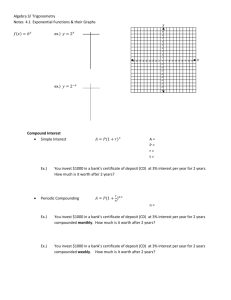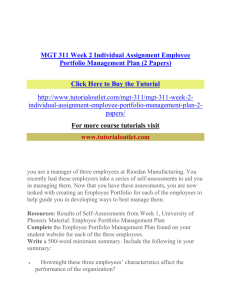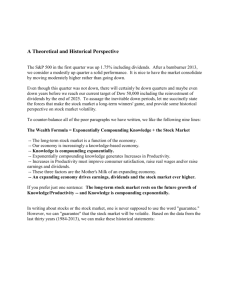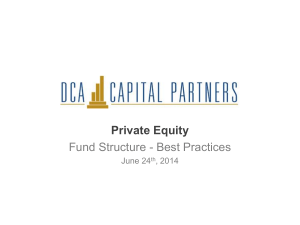When referring to property investment, the term 'compounding' is an
advertisement
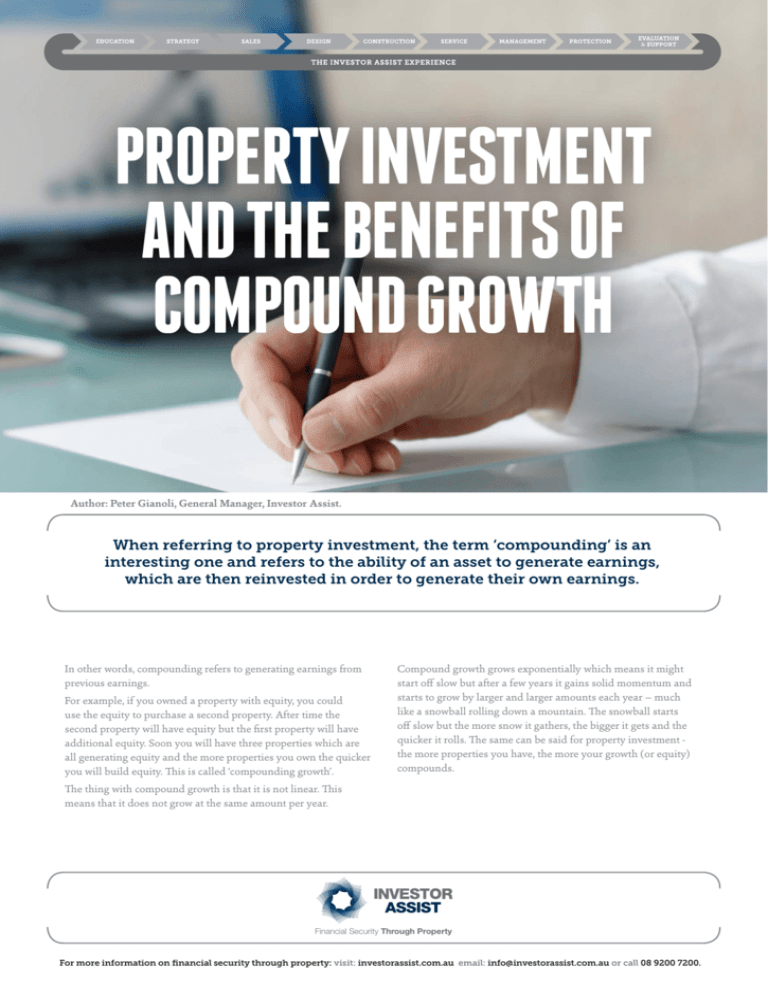
PROPERTY INVESTMENT AND THE BENEFITS OF COMPOUND GROWTH Author: Peter Gianoli, General Manager, Investor Assist. When referring to property investment, the term ‘compounding’ is an interesting one and refers to the ability of an asset to generate earnings, which are then reinvested in order to generate their own earnings. In other words, compounding refers to generating earnings from previous earnings. For example, if you owned a property with equity, you could use the equity to purchase a second property. After time the second property will have equity but the first property will have additional equity. Soon you will have three properties which are all generating equity and the more properties you own the quicker you will build equity. This is called ‘compounding growth’. Compound growth grows exponentially which means it might start off slow but after a few years it gains solid momentum and starts to grow by larger and larger amounts each year – much like a snowball rolling down a mountain. The snowball starts off slow but the more snow it gathers, the bigger it gets and the quicker it rolls. The same can be said for property investment the more properties you have, the more your growth (or equity) compounds. The thing with compound growth is that it is not linear. This means that it does not grow at the same amount per year. Financial Security Through Property For more information on financial security through property: visit: investorassist.com.au email: info@investorassist.com.au or call 08 9200 7200. PROPERTY INVESTMENT AND THE BENEFITS OF COMPOUND GROWTH LINEAR GROWTH EXPONENTIAL GROWTH Illogical rules about compounding There are a few things to note about compounding that at first glance don’t appear to make any logical sense. One is that where you build a portfolio which doubles in value fairly consistently, the increase in value of the portfolio at each interval totals more than all the previous gains. You can see that the portfolio gains are compounding throughout the 42 years, resulting in exponential growth as shown in the graph below: COMPOUNDING PORTFOLIO GROWTH For example, in the portfolio shown below, it doubles in value every seven years (at gains of just over 10% per annum). In the seven year period between years 35 and year 42, the portfolio gains $3.2m which exceeds the collective gains of all of the previous 35 years ($3.1m). Year Portfolio 0 $100,000 7 $200,000 14 $400,000 21 $800,000 28 $1,600,000 35 $3,200,000 42 $6,400,000 Watching how the gains can accelerate when left to grow unimpeded by capital gains taxes and transaction costs should draw investors to two logical conclusions: (1) it’s best to start investing now; and (2) investing in assets like a well-located house in a capital city that has rapid and sustainable population growth (which you never have to sell) can be very appealing. Financial Security Through Property For more information on financial security through property: visit: investorassist.com.au email: info@investorassist.com.au or call 08 9200 7200. PROPERTY INVESTMENT AND THE BENEFITS OF COMPOUND GROWTH It’s best to start early 3. You don’t miss what you’ve never had An investor who starts earlier generally achieves a far better end result than one who starts later. Even if the late-starter invests more capital per annum, it is very difficult to ‘play catch-up’ simply because of the accelerating power of compounding growth. This is so true. The more automated your system for investing, the greater your likelihood for success. If you don’t touch it you can’t spend it and if you have a system such as a direct debit in place, it means you are less likely to forget payments, fall behind or incur penalty fees. Building wealth is ultimately reliant upon three things: 4. Reinvest the gains 1. having some capital to invest; Reinvesting your gains is particularly important, especially during a portfolio’s growth phase as it is an efficient way to grow and compound your wealth. Reinvestment is another form of forced savings and the sooner you reinvest, the quicker your compound growth will gather momentum. 2. the ability to command satisfactory returns consistently; and 3. time to allow the portfolio to compound. It’s not necessarily reliant on exceptional asset selection – it’s much more about patience, time and understanding how wealth is created through compounding returns. Five practical tips 1. Starting small is OK The examples above show it is better to invest in something rather than nothing. Investing small amounts regularly works over time because of the compounding effect. However, if you are going to start small be aware of the impact of transaction costs, such as purchasing fees, and invest efficiently wherever possible. 5. Most people just aren’t very good at saving This is unfortunate, but true. Most people begrudgingly pay bills when they are due but most people just aren’t very good at saving dollars every month, especially over the longer term. Some people may be able to build up a decent balance over the course of a financial year through spending less than they are earning, but it’s also deceptively easy to spend the balance on a car or a holiday when that time of year rolls around again. This is another reason why there are benefits to setting up an automated investment strategy. 2. Forced saving is good Investing in the real world Have you ever heard anyone say: “Money in my pocket or in my bank account just seems to disappear?” In the real world, usually the main focus of personal finances for most people in countries like Australia or Great Britain (where home ownership rates are high) is the family home or place of residence. This means the majority of people fall into one of these categories: Attempting to pile money up in a bank account doesn’t often work very effectively over the long term. Partly this is because you must pay tax on the interest and price inflation eats away at the value of the balance. It’s also because sooner or later that balance of money tends to get spent. You can set up a means of ‘forced savings’ via a direct debit into a specified investment account but why not invest and set up a direct debit account to pay off your home or investment whilst also benefitting from the added advantage of capital growth? (a) living mortgage-free in a home; (b) paying off the mortgage on a home; or (c) saving a deposit for a home. The practical tips detailed above suggest that regardless of which category you are in, having a forced saving or investment strategy is a sound idea. After all, a savings account will accumulate interest but it can’t benefit from capital growth. Financial Security Through Property For more information on financial security through property: visit: investorassist.com.au email: info@investorassist.com.au or call 08 9200 7200. PROPERTY INVESTMENT AND THE BENEFITS OF COMPOUND GROWTH If you are in the fortunate position of being in category (a), it might be useful to continue making payments as though you still do have a mortgage into a separately allocated investment account. After all, you have already proven that you can spare that amount per month! If you are in category (c) and are currently saving a deposit for a home, you have options available to you. You can purchase your own home first with a view to invest later, or you might want to reassess your plans and consider renting to invest. Using gearing to invest is a powerful means of accelerating returns, but should only ever be done moderately and sensibly, and obviously individual circumstances and risk appetites differ so consult a financial advisor where appropriate. If you are going to struggle to buy the home you want in the location you prefer for the budget you have available, you might want to consider renting for now and using your deposit to start your investment portfolio. This will enable you to live in the location you want whilst using your portfolio to build equity. Once you have sufficient equity you will have the funds available to buy the house you want in your preferred area. If you are currently paying off the mortgage on a home it might be worth investigating if there is an opportunity to increase repayments on your mortgage debt? Can you pay off more each month or make repayments fortnightly instead of monthly? Even if you are paying off a mortgage do you have enough equity in the property to borrow for an investment property? There are plenty of options available to investors but the key piece of advice to enable you to benefit from compound growth in the longer term is to start now. Whether you start small or take a more aggressive approach to building your portfolio, if you invest wisely it has the potential to generate significant rewards in the longer term. You might also consider using some of the equity in your home to borrow to invest in a sensible manner. DISCLAIMER: This information is of a general nature only and does not constitute professional advice. We strongly recommend that you seek your own professional advice in relation to your particular circumstances. Investor Assist Pty Ltd Builders Registration No. 13818. Financial Security Through Property For more information on financial security through property: visit: investorassist.com.au email: info@investorassist.com.au or call 08 9200 7200.



